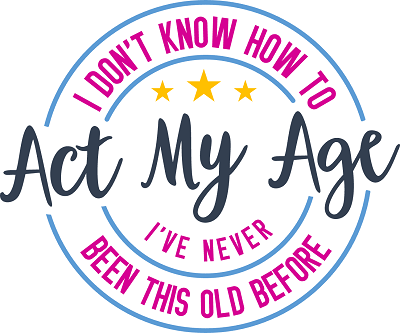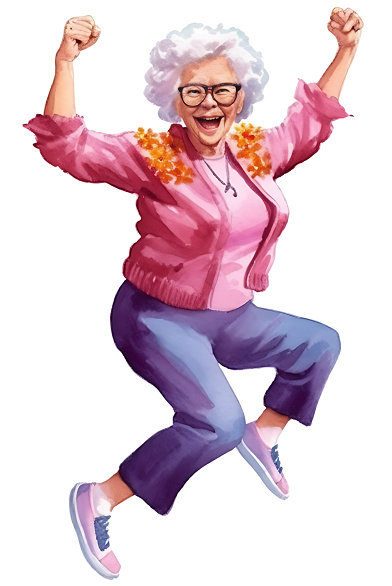 If you are in your 50s, congratulations. In the very beginning of the 1900s, the life expectancy at birth was just 31 years of age. These days, you can reasonably expect to live well into your 80s. Just recently, British online news provider The Telegraph pointed out that more and more human beings are making it to the milestone of 100 years. The obvious issues with growing older are the health problems that accompany a body that has worn down over time.
If you are in your 50s, congratulations. In the very beginning of the 1900s, the life expectancy at birth was just 31 years of age. These days, you can reasonably expect to live well into your 80s. Just recently, British online news provider The Telegraph pointed out that more and more human beings are making it to the milestone of 100 years. The obvious issues with growing older are the health problems that accompany a body that has worn down over time.
Even those who have worked very hard on their nutrition, physical fitness, mental and emotional states will find health problems beginning to develop, or become worse, in their early 50s. If your parents are still alive, you notice the deterioration of their health and independence, and it makes you determined to make some positive, healthy changes in your own life. Listed below are 15 of the top health concerns for the over 50 crowd, with some tips for how to prevent and treat them.
1 – Poor, Failing Vision
Eat like a rabbit. That is right, the old saying that carrots are good for your eyesight is definitely true. You should also begin scheduling a comprehensive eye exam at least every 2 years. Some eye problems are genetic, and once your vision begins to weaken, you usually cannot erase any damage done.
However, treatments for age-related vision changes are common. A healthy diet with plenty of carrots, leafy greens like kale, eggs, citrus, almonds, fatty fish like tuna and salmon, as well as berries, can help slow down the rate of your failing vision.
2 – Depression and Anxiety
Turning 50 has been the subject of several Hollywood movies describing what is well known as a “midlife crisis”. Aside from financial problems and relationship issues, men and women can find themselves anxious and depressed for a number of reasons. Menopause regularly debuts in women in their 50s, and men may be experiencing a long list of health problems.
Concern over society, children and grandchildren, the economy and the future of planet Earth – these concerns all begin to become more prevalent once you hit your 50s. Exercise has been proven to release hormones that make you feel better about yourself and the world you live in. Exercise regularly, and consult a therapist if you believe your feelings of anxiety and depression are negatively impacting your life.
3 – High Blood Pressure
Usually, you want to aim for a blood pressure that is higher than 120 over 80. However, you also want a reading lower than 140 over 90. (Remember, these are just averages. You need to get your blood pressure checked frequently, at least once a year once you turn 50.) Exercise and enjoy a heart healthy diet that limits or eliminates processed food, while ramping up your level of vegetables, fruits and whole grains.
Drink plenty of water and get lots of rest. This helps you regulate a healthy blood pressure level. In severe cases, your physician may prescribe medicine. However, regular exercise and a proper diet have been proven to naturally return your blood pressure to a healthy level without medical assistance in most cases.
4 – Menopause for Women
The average onset age for menopause in the United States is 51. Hot flashes are just one symptom. Women may experience sexual dysfunction, and even a loss of bone density. Your risk for heart disease increases with menopause, and you may gain weight and lose energy. Menopause is a natural process, and can be treated with medication and therapy.
5 – Erectile Dysfunction for Men
Thanks to male enhancement pills like Viagra and Cialis, and the aggressive advertising which addresses this issue, erectile dysfunction or ED has gone from being a hush-hush topic to dinner table conversation. Once again, nature provides a non-medical solution.
Proper exercise, a smart diet and cutting back on the amount of alcohol and tobacco consumed can quickly give men the healthy ability they enjoyed in this area when they were much younger. Salmon, nuts, soybeans, seeds and sunflower oil are important to an ED treatment diet. You should also limit the amount of processed foods you eat, limit or totally avoided processed sugar, and cut back your salt intake to less than 1,500 mg. per day
6 – Loss of Hearing
A partial loss of hearing becomes a real concern for some people in their 50s. This occurs because of a disease in the middle ear or inner ear. Hearing loss can be caused by exposure to loud noises, a head injury, illness, drugs or the simple aging process. Have your hearing checked when you turn 50, and any time that you and your loved ones notice a diminished ability to hear normal conversations and sounds.
7 – Thinning Hair and Hair Loss in Both Men & Women
Thinning hair in men and women, male pattern baldness in men, these are 2 vanity concerns that can actually begin to appear as early as your 30s and 40s. There is no food you can eat to grow more hair. However, a healthy diet with fewer processed foods, lots of fruits and vegetables, whole grains and dietary fiber can limit non-hereditary hair loss in the future. Limiting the amount of hair care products you use can also positively affect how much hair you have, and how much hair you keep.
8 – Maintaining a Healthy Cholesterol Level
This is all about your diet and physical fitness level. You do not have to start running marathons or become an aggressive weightlifter. Just exercise frequently, 3 to 5 times a week, for at least 30 minutes at a time. This could mean a power walk with a friend, joining a cycling class, a hiking group or playing with the grandkids.
You can also stop smoking, regulate a healthy body weight and increase the amount of fat in your diet to help maintain healthy cholesterol levels. Time and time again, a nutrition profile limited in processed foods, sugar and salt, but high in vegetables, fruits and whole grains, leads to an overall healthy body, including good cholesterol readings.
9 – An Overactive Bladder or Incontinence
An overactive bladder means that you can no longer hold urine with much control. This can lead to an “accident”. It can also mean you experience sudden urges to use the restroom immediately. Incontinence can mean that you are simply drinking too many fluids. However, it can also be a symptom of a urinary tract infection. If you find you are urinating much more frequently than before, sometimes having to go quickly, schedule an appointment with your doctor.
10 – Age Spots, Wrinkles and Other Skin Problems
Once age spots start to appear, you have already done damage to your skin. Wrinkles, dry skin and other similar issues begin to appear in force in your 50s. There are plenty of topical treatments and lotions to treat these issues. Aside from sun damage, menopause and a poor diet can also cause skin problems.
Make sure you are using a sun screen of SPF 30 or higher if you are going to be outdoors for more than 20 or 30 minutes. Salmon, blueberries, tomatoes, carrots and other yellow or orange fruits or vegetables, beans and peas, nuts, spinach and other dark, leafy green vegetables will help improve the health, strength and appearance of your skin at any age.
11 – Being Overweight and Obesity
Your metabolism has slowed down considerably. This could lead to weight gain. You probably know that levels of overweight and obesity are higher than they have ever been in the history of mankind.
This is directly linked to processed foods, trans fats, refined white sugar and monosodium glutamate in your foods. Once again, the ever-dependable healthy diet and exercise combo can keep overweight and obesity from causing other health problems, including the next 2 we are about to discuss.
12 – Prediabetes or Type II Diabetes
Diabetes gives you warning signs. Often times, obesity is a leading indicator. Type II diabetes can be prevented, because prediabetes tells you that there is a problem on the horizon. A few silent symptoms of prediabetes are putting on a few pounds that you cannot seem to lose, blurry vision, unquenchable thirst, extreme fatigue and cuts or wounds that will not heal. Once you turn 50, you should get a prediabetes screening once every 2 to 3 years.
13 – Keeping a Healthy Digestive System
As much as 70% to 75% of all human infection and disease begins in your gut. Your digestive system is so important to a healthy body and mind, inside and out, no matter what your age. But especially once you turn 50, when your physiological processes have been worn down due to repetition, you need to keep a healthy digestive system.
Sauerkraut, beans, yogurts full of probiotics, ginger, peppermint and salmon all help regulate a healthy digestive system. You also want to make sure you are getting plenty of dietary fiber.
14 – Enlarged Prostate (BPH), For Men
The number one prostate problem for men over 50 years of age is an oversized prostate. This is also called benign prostate hyperplasia, or BPH. Doctors contend that this is a simple part of the natural growing process. But just like gray hair, those unwelcome midnight trips to the bathroom are not enjoyed by any man.
By the time a typical male turns 60 years of age, there is a 1 in 2 chance that he will suffer from BPH. Eating sesame seeds, salmon, tofu, bell peppers, tomatoes, avocados and plenty of green leafy vegetables, onions and garlic can help put off the onset of the eventually unavoidable BPH for as long as possible.
15 – Cancer
Throughout this discussion of health concerns for those 50 and over, you have seen regular exercise, proper rest, drinking plenty of water and eating lots of vegetables, fruits and whole grains discussed over and over. For limiting your risks of developing any of the many debilitating and deadly cancers, all of those recommendations give you your best chance.
Once you have contracted cancer, if it is caught early, in many cases progression can be stopped and even reversed. Studies in the last 20 or 30 years show that people with diets high in animal protein have a much higher incidence rate of developing multiple forms of cancer.


